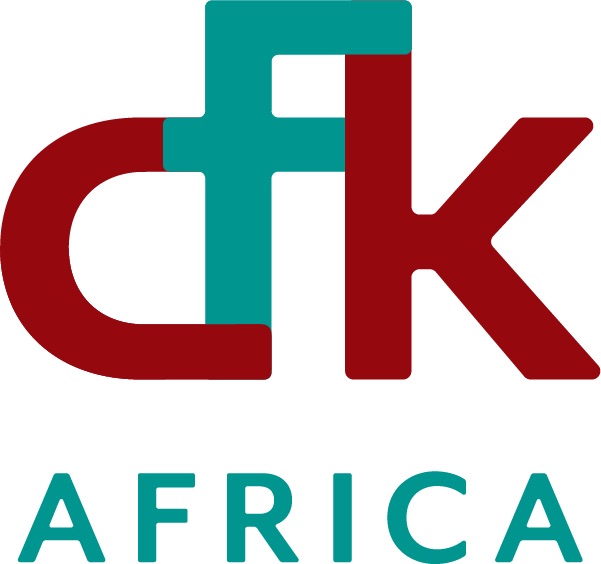CFK Africa is thrilled to announce the appointment of Jeffrey Okoro as its fifth Executive Director since its founding in 2001. With a profound passion for the potential of education and an enduring commitment to community-led development, Jeffrey exemplifies outstanding leadership and a growth-oriented mindset as he takes the helm of CFK Africa.
A resident of Kibera, Okoro first volunteered with the organization as a youth leader after post-election violence in 2009. He has since risen through the ranks of CFK Africa, from a peer mentor to administrative assistant, project officer, program coordinator, and most recently as deputy director. Jeffrey sat down with CFK Africa’s Deputy Director of Communications and Development to share about his journey and new role.

Could you tell us about your experience growing up in Kibera?
I moved to Kibera from Kisumu in Western Kenya when I was 13 years old. Living in informal settlements was a tough reality. I faced many hardships and had to grow up quickly, but Kibera truly shaped who I am. Living in the community built empathy and gratitude in me.
How did you manage to overcome these obstacles?
Education was a distant dream for me initially, but I was set on completing secondary school. When I was 13, I had to leave school due to a lack of funds to pay my school fees but I stayed persistent in applying for scholarships for three years, even though I was turned down several times. When I wasn’t in school, I worked construction jobs to earn money to support my family. Eventually, I was fortunate to be awarded a scholarship from Guadalupe Catholic parish that enabled me to complete my education. The scholarship I received to support my secondary education was not merely financial aid. It was an investment in my potential.

How did you first become involved with CFK Africa?
In 2003, I first learned of CFK Africa, which was then known as Carolina for Kibera, through the organization’s community soccer tournaments. I was drawn to the mission of using soccer to address ethnic tensions among youth. In 2009, after a time of election violence in Kenya, I secured a volunteer opportunity with CFK Africa as a peer youth educator. I provided sexual and reproductive health training to the youth in the community as well as community sensitization and mobilization. I also worked with Map Kibera, a program to map out key locations in the community. Through the process, I helped map out over 300 schools in Kibera which people didn’t previously know about. CFK Africa provided me with the opportunity to learn and grow.
How did your journey with CFK Africa progress from there?
CFK Africa recognized my dedication and commitment, and early on I earned a position in administrative support. My passion was truly in the field of education, and I later had the chance to serve as a Project Officer for Education. Throughout my work on a UNICEF project, I began to understand the scope of the problem of education in informal settlements and the large number of kids not going to school. Together with Professor Steve Arnold, we launched the Best Schools Initiative, an effort to increase primary school attendance and graduation rates in informal schools. Education is an equalizer; it gives young people who are born into tough circumstances a fighting chance. I know firsthand what education and economic mobility means for young people, for entire families.

What motivates you?
When I look back on my journey and where I come from, I realize that it’s not just my personal story, but also the story of the young people I grew up with. I was surrounded by incredibly talented individuals, but unfortunately, many of them couldn’t escape the grasp of drugs and crime. It’s these reflections that remind me of the promises I made to myself—to seize any opportunity given to me and strive to make even the smallest positive change.

What does leadership mean to you?
I feel a call to serve. I applied for the role of Executive Director to help other people live better lives. This is the mission of the organization; one I intend to amplify. The more I have learned about the experiences of real people in the community and how their lives transpire, I have become more and more inspired to proactively address community issues. I am not under the illusion that I am the only one who can lead CFK Africa to greater community impact, but I strongly believe that I am able to work with the team and the community to deliver on our promises as an organization. I am now in a position to make a significant impact and scale our efforts to help support other future youth leaders who have the drive and desire to reach their full potential.
What is your vision for your first 90 days as the Executive Director of CFK Africa?

I have thought carefully about what I would like to accomplish in the short term. I think it is most important to improve community connections and engagements. I recognize that I am taking up the role during a period of growth within the organization, which presents an opportunity to unlock creativity and spur innovation. Now more than ever, we must reflect on our approach and a long-term strategy of community connection by extending our engagements through collaborative networks. CFK Africa cannot be an island, we must be a bridge.
What is something that you look forward to in your new role?
I look forward to working hand in hand with the team, seeking ways to bring out their full potential. By fostering collaboration, building morale, creating a supportive environment, and enabling each team member to contribute their unique strengths and skills, I know we can make a meaningful difference within the community we serve.
